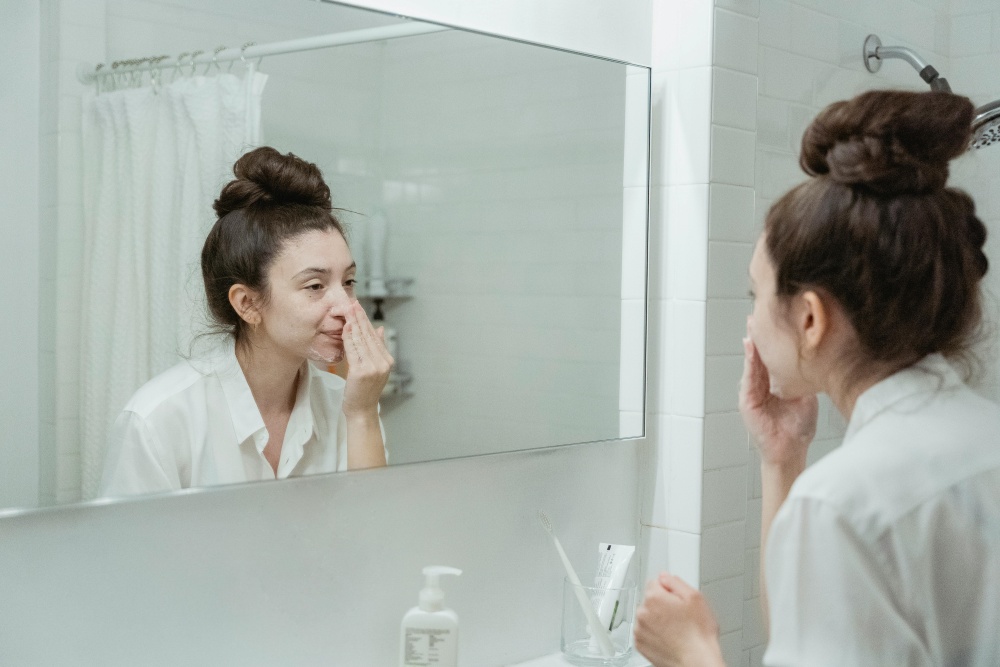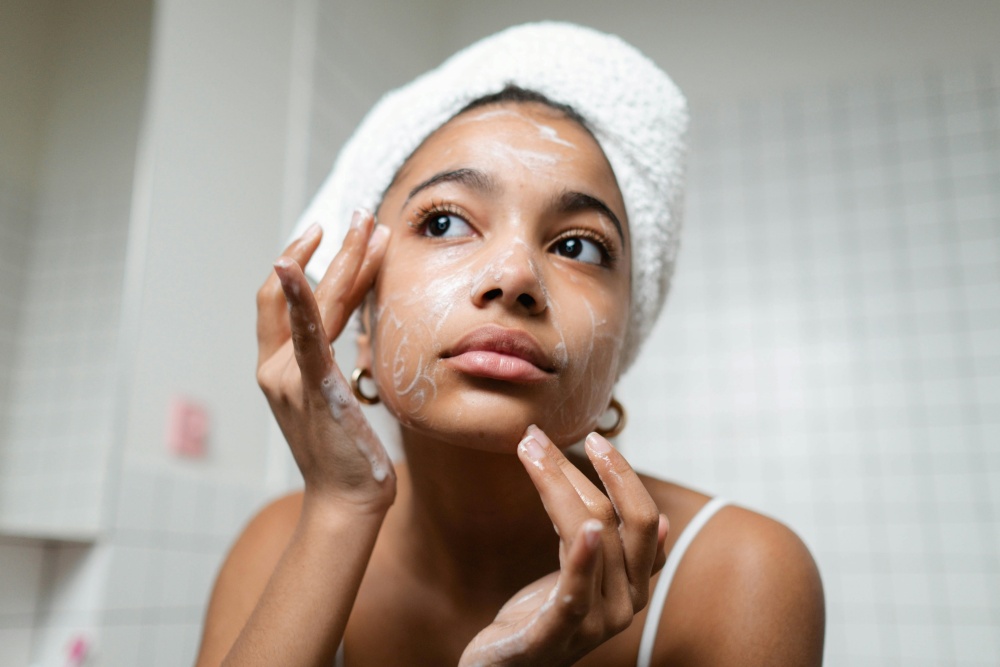As we approach the new year, it is an opportune moment to reflect on our skincare practices and establish intentions for cultivating a radiant complexion in 2025. And while skincare trends may ebb and flow, a consistent and well-informed routine remains a cornerstone of achieving healthy, vibrant skin.
This year, let’s prioritise attainable beauty resolutions that support your skincare goals. Here are ten realistic resolutions to guide you on your journey towards radiant skin in the new year.
1. Commit to Daily Cleansing
Daily cleansing is essential for maintaining healthy and radiant skin. This is because, throughout the day, our skin encounters various impurities, such as dirt, makeup, and pollutants, which can accumulate and lead to clogged pores and breakouts.
By cleansing your face every day, you effectively remove these impurities, promoting clearer and healthier skin. But be sure to choose a gentle cleanser that doesn’t strip your skin of its natural oils. And if you wear makeup or sunscreen regularly, consider a double cleansing method using an oil-based cleanser to dissolve impurities, then follow up with a water-based cleanser to ensure a deeper clean.
2. Prioritise Removing Makeup Every Night
Forget worrying about the scars that might be left behind from all the picking and popping. Our skin undergoes a natural repair and renewal process overnight, and sleeping with makeup on can hinder this process, potentially leading to acne. Since makeup prevents the skin from breathing, leaving it on at night can clog the pores, leading to breakouts and contributing to premature ageing.
So, make it a priority to thoroughly remove your makeup every night before bed. This allows your skin to properly rest and regenerate, promoting a healthier and more radiant complexion.
3. Integrate a Serum into Your Daily Skincare
Also, consider enhancing your skincare routine by incorporating a targeted serum. Serums are potent formulations designed to provide a potent dose of active compounds to target specific skin issues. Whether your focus is on brightening with vitamin C, balancing with niacinamide, or reducing the appearance of fine lines with retinol, there is a serum to complement your individual needs.
When choosing a serum, do not just go for the new and latest ones. Instead, consider your skin type and primary concerns. For example, if you have sensitive skin, choose gentle formulations with calming ingredients or those of lower concentrations. If you have oily skin, consider serums that regulate sebum production and minimise pores. Dry skin types can benefit from hydrating serums with hyaluronic acid or other humectants. And, of course, there are also specific ingredients to look out for if you have acne-prone skin.
4. Dedicate Yourself to Daily Sun Protection
While it may seem like a repetitive reminder, daily sun protection is paramount for maintaining youthful, healthy skin. After all, UV exposure is a primary contributor to premature ageing, causing damage that goes beyond visible signs like age spots and discolouration.
UV rays trigger oxidative stress, unleashing free radicals that damage skin cells and degrade collagen, leading to wrinkles and sagging. Furthermore, UV-induced inflammation can exacerbate breakouts and worsen acne scarring.
To safeguard your skin from these damaging effects, sunscreen is a must. Choose a broad-spectrum sunscreen with an SPF of 30 or higher, ensuring protection against both UVA and UVB rays. Apply it liberally to all exposed areas, such as your face, neck, and chest, after moisturising.
5. Extend Skincare to Your Neck Area
The neck and décolleté are often overlooked in skincare routines, yet these areas are just as susceptible to ageing and damage as the face. Therefore, to maintain a youthful appearance and prevent premature ageing, it is essential to extend your skincare regimen beyond your face. This includes cleansers, toners, serums, moisturisers, and, of course, sunscreen.
6. Experiment with Niacinamide and Vitamin C

Niacinamide and vitamin C are potent antioxidants that can significantly benefit your skin since both ingredients offer unique properties that work synergistically to improve skin tone and texture.
Niacinamide, for one, helps regulate sebum production, reduces inflammation, and strengthens the skin’s moisture barrier. Vitamin C, on the other hand, is known for its brightening and collagen-boosting properties.
To incorporate both ingredients into your routine, consider applying a niacinamide serum followed by a vitamin C serum. However, if you have sensitive skin, it is advisable to use them at different times of the day to avoid potential irritation.
If layering serums feels overwhelming, you could also consider supplementing your skincare through supplements like vitamin C tablets from Japan. Some studies even suggest that individuals with higher vitamin C intake may have fewer wrinkles. This is where supplements like the Hakubi White C Tablets formulated with a high content of L-Cysteine, vitamin C and vitamin B6 can be considered for enhanced skin brightening and support skin regeneration.
7. Embrace Hydration Inside and Out
There is no denying that hydration is fundamental for healthy, radiant skin since it plays a crucial role in maintaining skin elasticity and delivering nutrients to skin cells. Therefore, prioritise drinking plenty of water throughout the day to keep your body and skin hydrated from within.
Complement your internal hydration efforts with a hydrating skincare routine. Look for products formulated with humectants like hyaluronic acid, which attract and retain moisture, leaving your skin looking plump and supple.
8. Conduct Regular Skin Self-Examinations
Taking the time to examine your skin regularly can help you detect any unusual changes or potential signs of skin conditions early on. Familiarise yourself with your skin’s normal patterns and look for any new moles, changes in existing moles, or any other unusual spots or growths.
Perform a thorough skin check at least once a month, paying close attention to all areas of your body, including your scalp, face, neck, chest, back, arms, and legs. If you notice anything concerning, consult a dermatologist promptly for professional evaluation and guidance.
9. Enjoy More Makeup-Free Days
While makeup can be a form of self-expression, embracing your natural skin is a great way to enhance its health and allow it to breathe. Therefore, consider incorporating more makeup-free days into your routine. This gives your skin a chance to rejuvenate and could help prevent clogged pores and breakouts.
10. Explore the Benefits of Skin-Boosting Supplements
They say you are what you eat, and that applies to your skin as well. While a healthy diet and topical skincare are essential, incorporating skin-boosting supplements can provide an extra layer of support for a radiant complexion.
Collagen, for instance, which provides structure and elasticity to our skin, naturally declines with age. This decline can lead to wrinkles, sagging, and a loss of firmness. Studies, however, suggest that collagen supplements can help improve skin elasticity, promoting a youthful appearance, according to Healthline.
Consider adding collagen supplements like the Hakubi Collagen Tablets, which are formulated with collagen peptides, along with vitamins C and B to protect against sun damage and promote glowing skin. These Japanese collagen tablets also contain royal jelly, which may help boost collagen production, and hyaluronic acid for added moisture retention.
Our Hakubi collagen drink is also a popular product of ours that is worth your time and bucks!
Embrace the New Year with Glowing Skin
By incorporating these ten achievable skincare resolutions into your routine, you just might be well on your way to achieving the complexion you desire.
For an extra boost, consider exploring the world of Japanese supplements for the skin, such as the Hakubi White C Tablets and the Hakubi White C Drink (Japanese vitamin C drink). These supplements can complement your topical skincare efforts, working from the inside out to support your skin’s health and vitality.
As always, consult with your doctor before adding any new supplements to your routine, especially if you have any underlying health conditions or are taking other medications.



